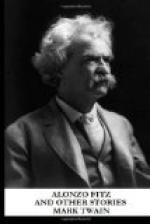The king got well. His first act was to proclaim the sacredness and inviolability of the ass; his second was to add this particular ass to his cabinet and make him chief minister of the crown; his third was to have all the statues and effigies of nightingales throughout his kingdom destroyed, and replaced by statues and effigies of the sacred donkey; and, his fourth was to announce that when the little peasant maid should reach her fifteenth year he would make her his queen and he kept his word.
Such is the legend. This explains why the moldering image of the ass adorns all these old crumbling walls and arches; and it explains why, during many centuries, an ass was always the chief minister in that royal cabinet, just as is still the case in most cabinets to this day; and it also explains why, in that little kingdom, during many centuries, all great poems, all great speeches, all great books, all public solemnities, and all royal proclamations, always began with these stirring words:
“Waw . . . he! waw . . . he!—waw he! Waw-he!”
SPEECH ON THE BABIES
At the banquet, in Chicago, given by the army of the Tennessee to their first commander, general U. S. Grant, November, 1879
The fifteenth regular
toast was “The Babies—as they comfort
us in
our sorrows, let us
not forget them in our festivities.”
I like that. We have not all had the good fortune to be ladies. We have not all been generals, or poets, or statesmen; but when the toast works down to the babies, we stand on common ground. It is a shame that for a thousand years the world’s banquets have utterly ignored the baby, as if he didn’t amount to anything. If you will stop and think a minute —if you will go back fifty or one hundred years to your early married life and recontemplate your first baby—you will remember that he amounted to a great deal, and even something over. You soldiers all know that when the little fellow arrived at family headquarters you had to hand in your resignation. He took entire command. You became his lackey, his mere body servant, and you had to stand around, too. He was not a commander who made allowances for time, distance, weather, or anything else. You had to execute his order whether it was possible or not. And there was only one form of marching in his manual of tactics, and that was the double-quick. He treated you with every sort of insolence and disrespect, and the bravest of you didn’t dare to say a word. You could face the death-storm at Donelson and Vicksburg, and give back blow for blow; but when he clawed your whiskers, and pulled your hair, and twisted your nose, you had to take it. When the thunders of war were sounding in your ears you set your faces toward




